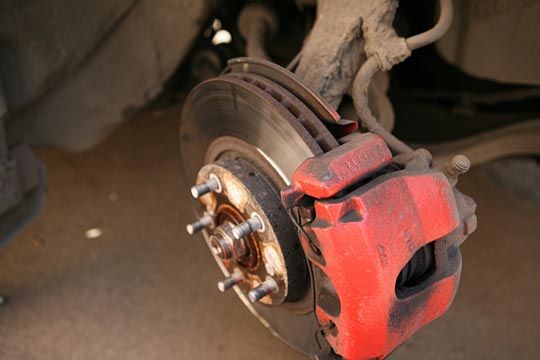Driving in a vehicle is always a certain risk, the level of which is influenced not only by the human factor, but also by the proper functioning and proper functioning of the main systems. In this case, the most important component is the brakes. It is their work efficiency that determines the overall safety of the movement. If the driver notices the beating of the brake pedal during braking, do not disregard this. Ignoring such symptoms may well lead to a complete or partial failure of the brake system.
The main purpose of the brake system is to control the change in vehicle speed, stopping and holding it in place for a long time by using the braking force between the road and the wheel.

The braking force can be created by a wheel braking mechanism, a car engine, an electric or hydraulic retarder in a transmission.
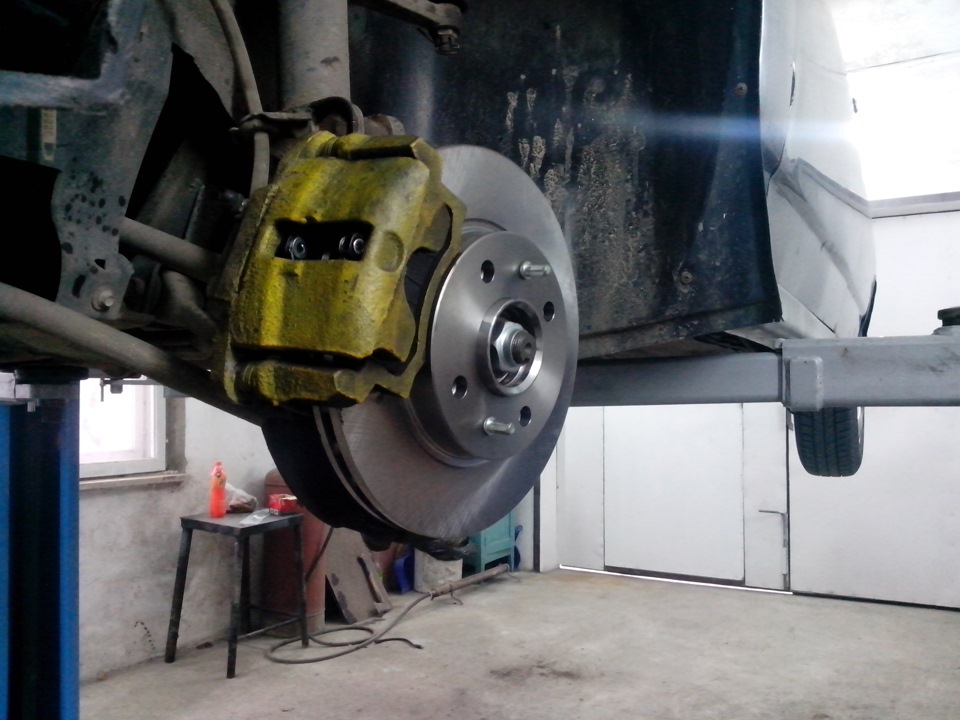
To implement these functions on a vehicle, these types of brake systems are mounted - the main (i.e. working), spare and parking (handbrake).
The working (main) brake system provides a vehicle stop and a controlled reduction in speed.
Spare brake system is used in case of failure or failure of the working system. It functions in a similar way to the main system. Spare brake system is implemented as a special autonomous system or part of the main brake system (brake circuit).

The main purpose of the parking brake system is to keep the vehicle in place for a long time.

The brake system is a very important means of ensuring vehicle safety. Trucks and cars use a variety of systems and devices that make the brake system more efficient, as well as more stable during braking - emergency brake booster, anti-lock braking system, brake booster and so on.
Beats the brake pedal when braking, what danger does this malfunction
Beating of the brake pedal - the presence of extraneous shocks and vibrations during braking. Usually, the higher the speed when braking, the stronger the beating.
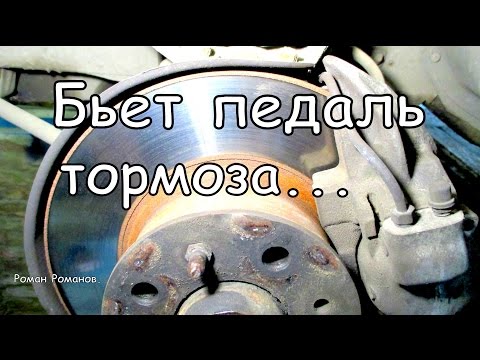
In addition, it is possible that during braking at a speed of 120 - 140, the heartbeat will be given not only to the pedal, but also to the steering rack and body. As already mentioned above, it is impossible to leave this problem unattended, since as a result of inaction, the brake system may fail.
Causes of runout, curved or damaged brake discs, driver actions
![]()
The first and most common cause of the beating of the brake pedal, which is usually called a service station, is damage or curvature of the brake disc.
Often, it is formed as a result of a sharp temperature difference - first the brake disc is heated, and then it is rapidly cooled (or vice versa). Because of this, the brake disc is deformed, and the brake pedal starts to hit when braking.
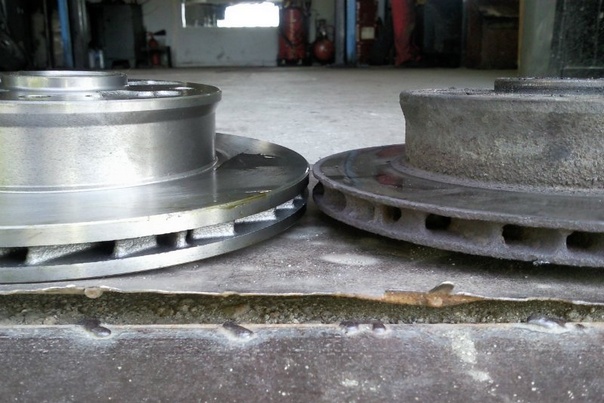
There is only one way out: replacing the brake discs on both wheels. If you change only one brake disc, as a result of different wear of the brake discs, the braking performance may become worse. However, in some cases, the heartbeat after replacement remains. As a rule, after a short break-in, this symptom disappears, but if not, then there are two reasons - the part is of poor quality or there is another malfunction.
Front brake pads, in what condition

It is not uncommon that the front brake pads become the cause of the beating of the brake pedal, or rather, their damage, abrasion or wear. To diagnose damage, check the surface quality and thickness of the products. If necessary, replace the front brake pads.
Rear brake pads, in what condition
Usually, drum brakes are mounted on the rear wheels of VAZ cars, which have one drawback - a high risk of moisture, dust and dirt accumulating inside the drum.

As a result, brake pads are capable of sticking, breaking, or undergoing rapid wear. As a result, the beating of the brake pedal begins.
The way out is a complete replacement of brake pads on both wheels (on the same axle).
Rear brake drums, in what condition
The cause of the beating can become not only the rear brake pads, but also the brake drum itself. It may distort or deform during operation. Touching the pads on a deformed drum will inevitably lead to vibrations that will be noticeable in the brake pedal.

Front and rear brake cylinders
Their incorrect operation or malfunction is also one of the probable causes of the beating.
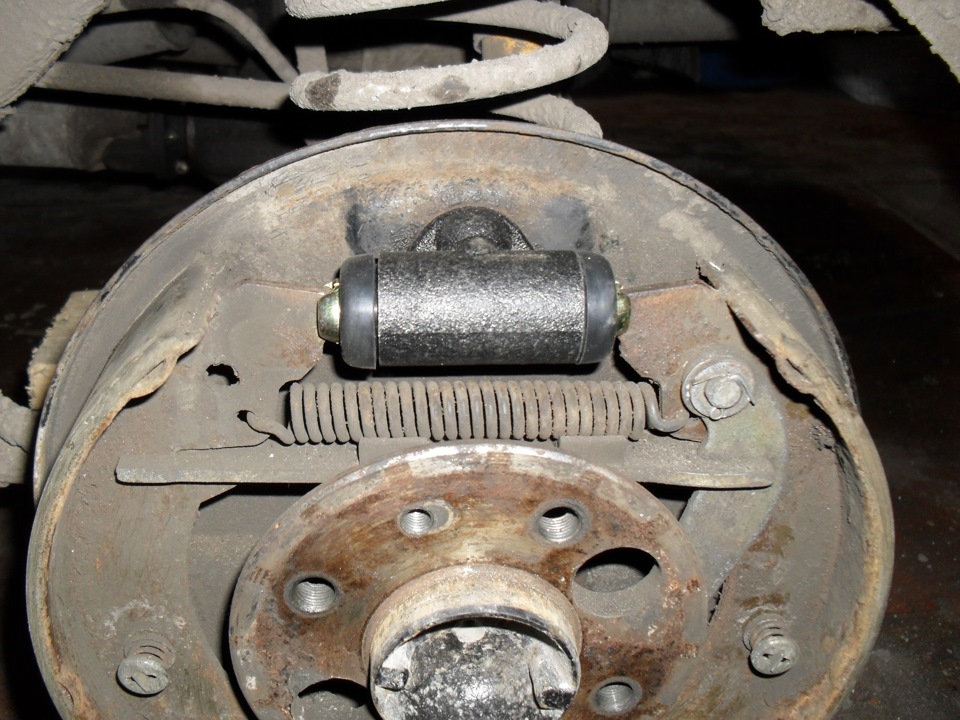
You can try to solve the problem using the rescue WD-40, however, if the tool did not help, you can not do without replacing the cylinder.
Other causes that are rare
In addition to the above, there are several more reasons why the brake pedal can hit when braking:
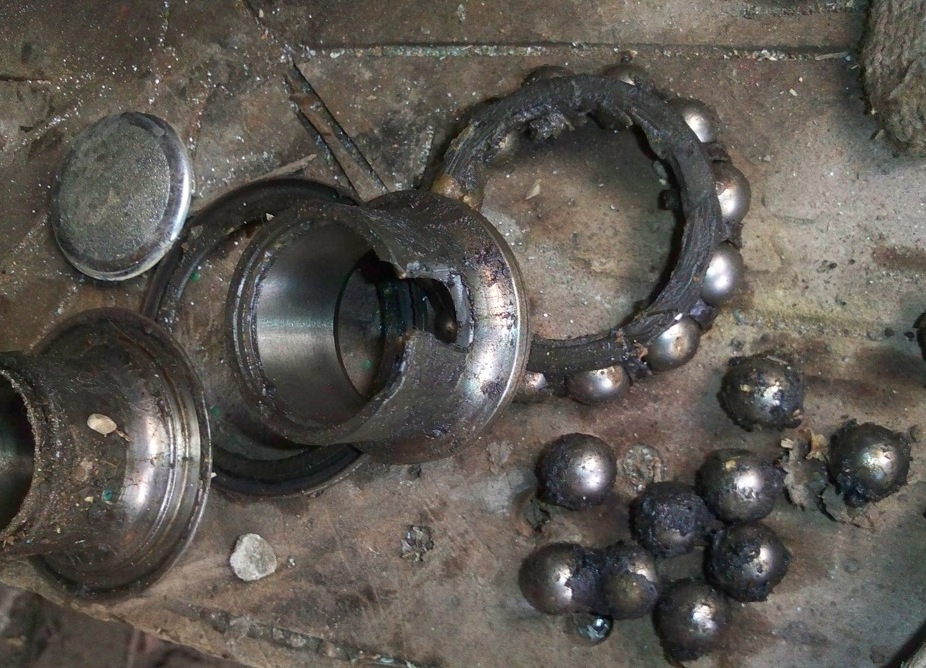
You should not rely on the fact that the problem is resolved by itself, since it is quite possible that this will lead to serious road troubles. To avoid problems with the brake system, you should regularly replenish the brake fluid level in the tank, systematically diagnose the brake system for lack of leakage and correct operation, as well as take care of the car and not bring the vehicle to a running state.
I welcome you friends to do-it-yourself car repair website. A car trip is always a certain risk, the level of which depends on the serviceability and correct functioning of the main systems. In this case, the brakes remain the most important unit.
The effectiveness of their work determines the overall traffic safety. If the brake pedal beats while braking, then this cannot be ignored. The consequence of such a breakdown may be a partial or complete failure of the system.
Consider the main problems
To understand why the brake pedal beats when braking, and to fix the problem, it is important to know the main causes of such a malfunction.
There are several of them:
1. Deformation of brake discs. During operation brake discs get the biggest load. They are exposed to constant high and low temperatures.
For example, if after prolonged braking and heating of the disk water enters the assembly, then the risk of product distortion is high. A further symptom may be the beating of the brake pedal during braking and the destruction of the disc.
The only way out is to immediately replace the wheels on the wheels of one axle. Otherwise, the braking performance may deteriorate due to different wear on the pads (discs).
There are situations when the heartbeat remains after replacement. This symptom usually goes away after a short break-in. If not, then there may be two reasons - a poor-quality part or the presence of another malfunction.
2. Brake pads on the front wheels. Often, the cause of the runout can be wear, abrasion or damage to one of the main components - pressure pads. To diagnose a malfunction, check product thickness and surface quality. Replace as necessary.
3. Brake pads on the rear brakes. As a rule, drum brakes are mounted on the rear wheels of the VAZ. Their disadvantages are a high risk of accumulation of dirt, moisture and dust inside the drum. As a result, brake pads can stick, undergo faster wear, or break. Bottom line - the brake pedal starts to hit. The way out in this situation is the same as in the previous case - complete pad replacement on one axis.
4. The brake drum. The cause of the beating can be not only the pads in the rear wheels, but also the drum itself. During operation, it may warp and warp. Touching the pads on such a drum will inevitably lead to vibrations, which will also be felt in the brake pedal.

5. Brake cylinders (rear, front). A malfunction or incorrect operation (for example, freezing) of the brake cylinders is one of the probable causes of beating. Sometimes a solution to the problem is possible without replacement. The best option is to use the rescue WD-40. If this does not help, then change the brake cylinder.
There are situations when the problem remains when replacing a particular node. Further diagnostics may be needed here. For example, the rear brake pad and drum may fail at the same time. As a result, their replacement should also be carried out in the complex.
Remember other important points. If you put a cheap and low-quality part or forgot about the need to balance the wheels, then do not be surprised at the beating in the pedals.
Indirect reasons that this includes
If, when you press the brake, the brake pedal beats, do not limit yourself to studying direct causes. There are situations when failures are caused by failures in other mechanisms.
Here you can highlight:
1. Deterioration of bearings of a nave. Read how to replace the hub bearing.
2. Damage (deformation) of the levers on the front wheel ("saber").
3. Problems with wheel balancing. It is easy to recognize it - vibrations will be felt not only in the brake pedal, but also on the entire car body. Ignoring the problem is life threatening.
Immediately go to the service station and give the wheels for balancing. If this does not help, then the only way out is to buy a new product.
4. Broaching of bolts (nuts). At the first sign of a run out, check the quality of the screw drive. This reason is commonplace, but it is precisely because of poor-quality broaching that backlash and beating in the brake pedal may appear. You can throw out a considerable amount for repair, and then stumble on loose bolts (nuts).
How to avoid trouble?
The assumption that the problem itself will "resolve" can lead to serious problems on the road (including road accidents).
To avoid problems with the brakes, do the following:
- Regularly replenish the level brake fluid in the tank;
- diagnose the brake system for proper operation and no leaks.
If you cannot handle these works on your own, then entrust this work to professionals. Be attentive to your "iron horse".
If the brake pedal starts to hit when pressed, it is better to immediately diagnose, identify and fix the problem. Otherwise, you risk many lives - yours, loved ones and other participants in the movement. Good luck on the road and of course without breakdowns.
16.05.2014Brake system - I think no one needs to explain the importance of its serviceability. Even any competent tuning begins with refinement of the brakes. Well, if you have a regular city chisel, this does not mean that the brake system should not be given attention, they say, "so we get there." You’ll reach, but to which hospital? Okay, that's not the point.
The beating in the brake pedal is the presence of extraneous vibrations, shocks during braking. As a rule, the higher the speed during braking, the stronger the beating. It is also possible that when braking from a speed of 140-120, the beating will be given not only to the pedal, but also to the body and steering rack.
If you drive into the service, they will immediately tell you: “change the front wheels”, but alas, this reason, on the mountain for all servicemen, is far from the only one. There can be both direct and indirect reasons, i.e. problems can be with the braking system, as well as with other elements of the car.
The main causes of the beating of the brake pedal
Direct reasons
As stated above, direct causes are directly related to the brake system itself:
- Curved brake discs are the most common cause of a malfunction. The bottom line is that due to the abrupt heating-cooling, the brake disc is bent and beating appears accordingly. Such a disc is necessary, moreover, replaced with a kit for both wheels.
- Front brakes are also the most common cause of a malfunction. to new ones.
- Rear brake drum - due to distortion or heavy wear (), they also hit the brakes.
- Rear brake pads - may stick to drums, crumble, wear out, resulting in a beating. It should be on new.
- Unforgettable about the brake cylinders (both front and rear) - they can sour and stop working normally. You can sprinkle with water, but it is better to replace it ().
It often happens that car owners change all of the above possible elements, but the problem remains. It also occurs that the problem, on the contrary, appears after replacing some elements. Here, the matter lies in the quality of spare parts: pads, unbalanced brake discs, etc. but also how they are installed on the car.
Indirect reasons
Indirect causes are running gear, human flaws, etc.
- Worn wheel bearings.
- Worn daisies or saber (front wheel levers).
- Unbalanced wheels - such wheels will give a beating more likely on the body itself than on the brake pedal. You can get rid of this problem only by balancing or changing the wheels. It is worth noting that often budget tires and wheels are poorly balanced, as a result of which this problem appears.
- The human factor - any elements are not screwed up: guides, racks, etc.
It also happens that the beating gives into the steering rack, but more on that in the corresponding article.
We will discuss and address the cause of the beating of the brake pedal. Let's talk about why when braking, the brake pedal pulsateswhat are the direct and indirect causes of failure.
Did you know? The electric brake drive is used on hybrid cars as an auxiliary tool for regenerative braking - instead of consuming braking energy, the reverse process is taking energy from the wheels to the battery, thereby slowing the car.
The main causes of brake beating
Consider the main causes of trembling and beating of the brake pedals, which directly or indirectly affect the brake pedal.
Important! The higher the speed of movement - the stronger the brake pedal beats, therefore, if a breakdown is detected, do not accelerate in a car so as not to get into an accident.
Direct reasons
Direct causes are car parts that are directly related to the brake pedal. Let's consider in more detail.
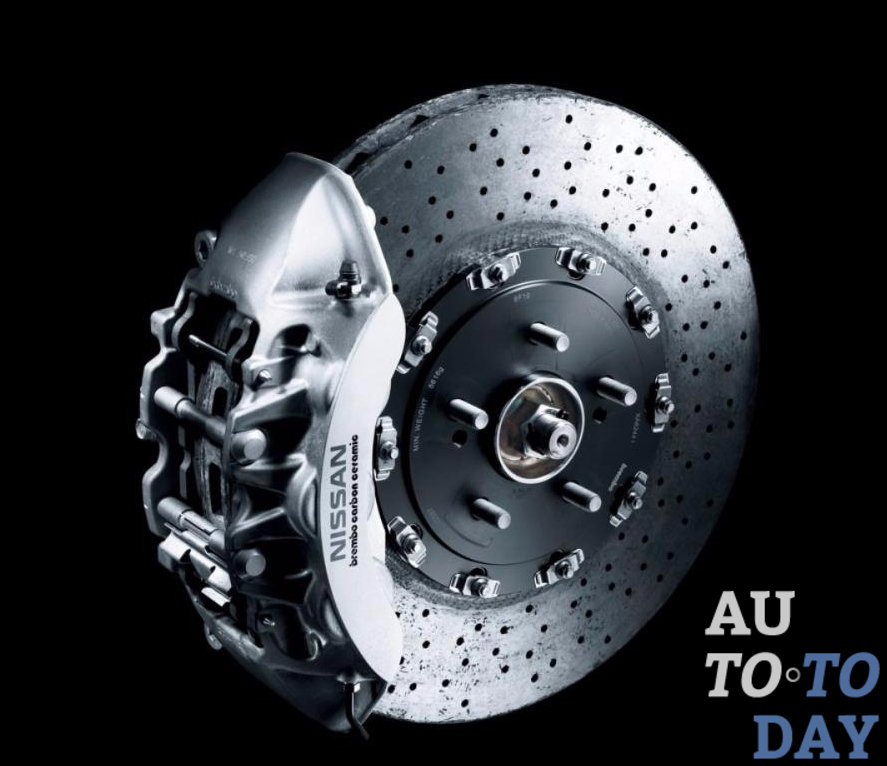 Many car owners fix the possible problems that are described above. But the problem still remains. The reason may even lie from the replacement of some elements. It all depends on the quality of parts: pads, brake discs and more. And it also depends on the master who installed them on your car.
Many car owners fix the possible problems that are described above. But the problem still remains. The reason may even lie from the replacement of some elements. It all depends on the quality of parts: pads, brake discs and more. And it also depends on the master who installed them on your car. Thus, we examined most of the problems that are directly related to the beating of brakes during braking. However, the fact is that in addition to direct reasons, there are indirect ones that are more difficult to identify.
Indirect reasons
Indirect causes are breakdowns or malfunctions that are not directly related to the braking system. Let's consider in more detail.
 It is difficult to identify indirect problems yourself, so after checking the entire braking system, it is worth contacting the service.
It is difficult to identify indirect problems yourself, so after checking the entire braking system, it is worth contacting the service. Important! To avoid problems with the brakes, you need to top up the brake fluid on time and regularly carry out diagnostics of the car's braking system.
How to fix the problem
If you find a part due to which the brake pedal twitches during braking, then it is worth analyzing the degree of deterioration. If the part is badly damaged, only a replacement will help.
 Only "souring" of brake cylinders is safe to "treat". For this, the WD-40 is used. If this tool does not help, then you need a replacement. It’s not worth several times to “patch” barely working parts, because when braking even at medium speed, the defective part will simply fall apart and bring much more waste.
Only "souring" of brake cylinders is safe to "treat". For this, the WD-40 is used. If this tool does not help, then you need a replacement. It’s not worth several times to “patch” barely working parts, because when braking even at medium speed, the defective part will simply fall apart and bring much more waste.
Why there is a brake whistle, how to eliminate the phenomenon
Having considered the reasons why the brake pedal beats when braking, we turn to the component of the brake system - the pads. Whistling brake pads, perhaps the most unpleasant sound that can only make a car. Therefore, understanding and solving this problem is very important.
And so, brake pads can creak for the following reasons:

Did you know? Google has created and commissioned unmanned vehicles. As of the summer of 2015, 20 such cars are already driving through the streets of Mountain View. In the future, these cars will replace taxis.
We examined why the brake pedal beats when braking. They told you about what needs to be done in such a situation, and damage is so dangerous.
Subscribe to our feeds in
Brakes, without exaggeration, are the most important system of any vehicle, since it is not only a calm and comfortable ride that depends on its clear and uninterrupted operation, but also the life of the driver and his passengers. The validity of this statement is confirmed by many years of statistics and personal experience of a multi-million army of motorists.
There are quite frequent cases when symptoms seemed to appear in an apparently seemingly sound braking system, which caused the car owner to be unaware of the true technical condition of the brake system elements. Consider the most common of them.
Causes of the beating of the brake pedal
So, we will try to understand not only the reasons for this, a rather unpleasant phenomenon, but also the methods for its elimination. The main problematic of this negative effect is that when the vehicle speed increases, the amplitude of the “beat” of the brake pedal increases, in addition to it, vibration is transferred to the steering rack, steering wheel and car body.
The main causes of the beating of the pedal during the braking of the vehicle are:
Damage or deformation of brake discs. This happens, as a rule, in the process of abrupt cooling of a strongly heated brake disc. The solution to the problem is the timely replacement of the disk with a new one or one that has been deliberately checked for the absence of distortions, and on both wheels at the same time.
Exceeding the level of permissible wear of the friction linings of the front brake pads. Eliminated by replacement.

"Sticking", destruction ("crumbling"), or increased wear on the lining of the rear brake pads.
Excessive wear on the inside or deformation of the rear brake drums. The most effective way to eliminate the experts consider replacing a deformed (worn) drum with a new one.
Malfunction of the brake cylinders (both front and rear brakes). The most common is the process of the so-called "acidification". There are two options for solving the problem. The first is the application of a WD 40 layer. However, this option is just as simple, as ineffective. The second is replacing the brake cylinder.
Sometimes a situation is created that leads inexperienced motorists to a state of confusion: the faulty element of the system is replaced, and the "beating" of the brake pedal continues. This means, in most cases, the following: poor quality of installed units, imbalance in the brake discs, or the presence of another (or several) defective element.

In addition, along with the reasons described above, there are several more reasons for the situation when the brake pedal beats when braking. They are quite rare, but nonetheless worthy of mention:
